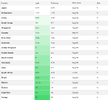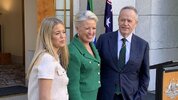- Joined
- 3 July 2009
- Posts
- 27,650
- Reactions
- 24,555
Which IMO is exactly what is meant to happen, productivity is at an all time low, improving productivity requires workers to be more motivated, what you described above is an exercise in increasing motivation.I've been watching a slow wind down, consumers are slowly tightening their belts as disposable income slowly shrinks, and as fear of a recession or job loss starts to become a possibility in their world.
Over the past three months my business has had an increase in the number of people coming in with their resumé looking for a job or work experience. I haven't seen that for a few years.
The trick is not to be blamed for it, Hawke did well landing it, Keating wore it, Albo learnt from the school of hard knocks.
He is doing ok, people are stitched up to the eyeballs, they can't kick up because immigration is supplying a ready replacement for the disgruntled worker and a new norm is being cast where owning a home isn't going to be for the working class.
Intergenerational loans will soon be suggested IMO.
But in the Govts defence, there isnt many options, doing business in Australia is extremely high.


